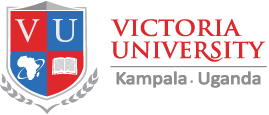Quick Facts
Credential
Bachelor's Degree
Delivery Options:
Both On-Campus and Online - Some of your Classes will be in-person, on campus and some will be done online.
Duration: 3 years
With a typical full-time course load, this programme will take 3 years to complete.
Language of instruction
english
Admission Requirements
Normal Entry Requirements for Degree Courses (in line with NCHE requirements)
To gain admission to the programme, you must first of all satisfy the general requirements for admission into Victoria University at a Bachelor's level. In addition, a candidate shall be eligible for admissions to the programme on meeting any of the following minimum qualifications:
Direct Entry:
At least Two Principal passes in the Uganda Advanced Certificate of Education (UACE) or its equivalent
and at least a credit in English and Mathematics at O-level.
Other entry requirements:
Professional qualification: candidates who completed level one of any professional programme will also be eligible.
OR
Mature age scheme: Passed a mature age entrance examinations.
Foundation programme: Applicants should have passed with at least a class three (Pass) equivalent to 2.00 to 2.79.
Applicants whose first language is not English will be required to demonstrate a proficiency in the English language by passing an English proficiency Test conducted by the University.
Admission Requirements for Undergraduate Students (Ugandans)
Diploma transcript if applicable
Certificate transcript if applicable
UACE result slip
UCE result slip
National ID/passport/ birth certificate
Passport photos
Admission fees UGX250,000
Bank: STANBIC BANK
USD Account: 9030020161247
Swift Code: SBICUGKX
Admission Requirements for Undergraduate student (Non-Ugandans)
· Secondary certificate equated from UNEB
· Diploma transcript if applicable equated from NCHE
· Certificate if applicable equated from NCHE
· National ID/passport/ birth certificate
· Passport photos
· Admission fees $78
Bank: STANBIC BANK
Account: 9030020161085
What you will Learn
You will embark on a transformative educational journey that equips you with a comprehensive set of skills and knowledge essential for success in the dynamic world of public service.
When you successfully complete the course you will have achieved the following Course Learning Outcomes:
Public Service Delivery: Examine various models of service delivery in the public sector and explore innovative approaches to improving service quality and citizen satisfaction. Understand the role of technology and innovation in transforming public service delivery.
Global Perspectives: Gain insights into global trends and challenges shaping public administration and management worldwide. Explore comparative perspectives on governance, policy implementation, and administrative reform.
Public Sector Management: Explore strategies for efficient and accountable management of public resources, including budgeting, human resource management, and strategic planning. Understand the intricacies of public sector organizations and how to optimize their performance.
Policy Development and Analysis: Learn how to formulate, implement, and evaluate public policies to address societal challenges effectively. Acquire the analytical skills needed to assess policy impacts and make informed decisions.
Ethical Leadership: Cultivate ethical leadership qualities essential for promoting transparency, integrity, and accountability in public administration. Learn how to navigate ethical dilemmas and uphold the highest standards of professional conduct.
Career Opportunities
Public administrators possess a diverse skill set that opens up a wide array of career opportunities across various sectors. Here are some of the career paths available to individuals with a background in public administration:
Government Administration: Public administrators can pursue careers in local, state, or federal government agencies, working in roles such as city manager, county administrator, budget analyst, program coordinator, or policy advisor. They play crucial roles in implementing government policies, managing public resources, and delivering essential services to citizens.
Public Policy Analysis: Public administrators with strong analytical skills can pursue careers as policy analysts, researchers, or consultants, working in think tanks, research institutes, advocacy organizations, or government agencies. They conduct research, evaluate policy proposals, analyze data, and provide recommendations to policymakers to address complex social, economic, and environmental challenges.
Urban and Regional Planning: Public administrators interested in community development and urban planning can pursue careers as city planners, zoning administrators, or community development specialists. They work with local governments, community organizations, and private developers to create sustainable land use plans, promote economic development, and enhance the quality of life in urban and rural areas.
International Development: Public administrators interested in global issues can pursue careers in international development organizations, humanitarian agencies, or multilateral institutions. They may work in roles such as project manager, program officer, or policy advisor, contributing to development projects in areas such as poverty alleviation, disaster relief, education, and sustainable development.
Public Finance and Budgeting: Public administrators with expertise in financial management can pursue careers in budget analysis, financial planning, or fiscal policy. They may work in government agencies, financial consulting firms, or research organizations, managing budgets, analyzing revenue and expenditure trends, and advising policymakers on fiscal matters.
Tuition & Fees
The tuition and fee amounts are estimates based on current academic year's rates. For financial planning purposes, please use these totals as an approximate estimate of your costs. Actual fees may vary by term and enrolment activities.
Download
